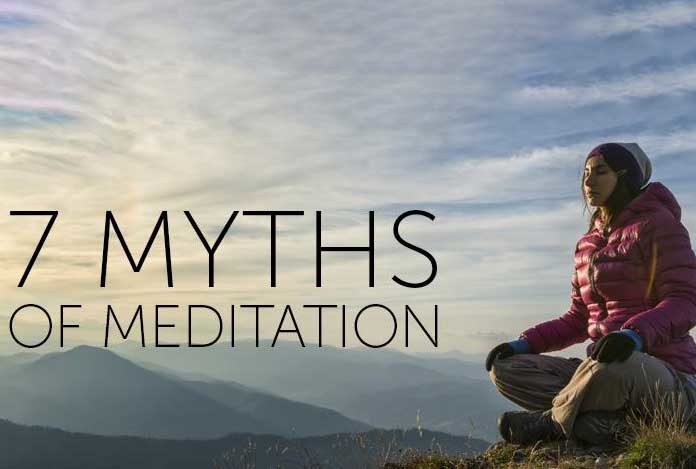
These days, meditation is prescribed by doctors and is practiced by one and all; from scientists, businessmen and artists to students, teachers and military personnel – even politicians! Although the magic of meditation is known to everyone, but there are some misconceptions about its practice that deter people from doing it and completely reaping its benefits related to mind, body and spirit. In this article, Deepak Chopra discusses some of these myths, while encouraging everyone to reap its benefits with regular meditation.
Myth 1: Meditation is Not Easy
The whole image of meditation is such that it is an occult practice, which is really taxing and performed by only saints, holy people and spiritual practitioners. Well, the reality is that if you learn meditation from an experienced and knowledgeable teacher, then performing it can be quite easy and a real fun.
Meditation incorporates simple techniques like redirecting all your attention to your breath or chanting a mantra. The reason why meditation looks difficult is that we try too hard to concentrate, and we want to see instant results. We become result oriented and focus only on the outcome, instead of the process. Sometimes, we even feel that we are doing it all wrong.
So, it is recommended that you learn meditation from an experienced teacher to make sure that you enjoy practicing it and get maximum benefits from the same. A teacher will be your guide in understanding your experiences, helping you face obstructions and having a nurturing daily practice.
Myth 2: You Need to Quite Your Mind to Meditate Successfully
According to Deepak Chopra, this is one of the most common meditation myths among people and also the leading cause why people give it up out of frustration.
As a matter of fact, meditation is not about forcefully stopping the thoughts in your mind or to have an empty mind. This will only create more stress. The thoughts can’t be controlled or stopped, but it is in our hands to decide how much attention needs to be given to those thoughts.
We cannot force our minds to become quiet but with meditation, we can certainly find the idyll and peace that already exists within us in between our thoughts. The space between our thoughts – referred to as gap – is plain consciousness, silence and peace.
During meditation, we use an image like breath, object and mantra that relax our mind amidst all worldly chaos. When we encounter thoughts, we do not have to push them away. Instead, we need to turn our attention to the object or image that we have chosen for our practice. During meditation, there are a few moments here and there when the mind goes into the gap and feels the refreshing awareness. When you meditate daily, you get accustomed to spending more and more time in the state of silence and awareness.
Even if you feel that you cannot control your thoughts coming to you during meditation, you can still receive benefits for sure. Don’t think that you have failed at it or you are wasting your time with the practice.
Deepak Chopra says that when his friend taught meditation, he told his students the thought that they were having thoughts is the most important thought. This isMeditation-Implies-Escaping because in such a condition, people are aware that they are having thoughts and it makes them realize that they are the thinker and not the thought. This is a breakthrough as this shifts the reference from your ego mind to a state of awareness. It helps you experiencing more peace and makes you open to possibilities.
Myth 3: It Takes Years of Practice to Get Any Benefits from Meditation
The benefits of meditation are not momentary. In fact, they are for long term and you can see the benefits immediately from the very first time you start meditating or in the first few days of your daily practice. Scientific studies claim that meditation can leave a deep impact on your mind and body in just a few days of practice.
A study conducted by Harvard University showed that only eight weeks of continuous meditation helped people decrease anxiety and experience greater sense of calmness. It also grew the area of the brain related to memory and the regulation of stress, empathy and sense of identity. People also experience sleep benefits. Other benefits include improvement in concentration, decrease in blood pressure, reduction in stress, and better functioning of the immune system.[1]
Myth 4: Meditation Implies Escaping
Chopra opines that meditation is not about losing touch with the reality and the true self. When you meditate, you realize the true potential of your mind. You are in a better position to analyze the thoughts of the past and apprehensions of the future. You are able to rest your mind in the present.
With meditation you experience that your self is infinite and not bounded by any limitation. When you practice meditation on a daily basis, you become more perceptive and your clarity expands.
Some people use meditation as a tool to escape emotional issues that have not been resolved. This is against the goal of meditation and mindfulness. There are many techniques in meditation for the release of toxic emotions. If you are dealing with emotional trauma, you should work with a therapist, who can help you heal pain of the past, helping you return to the natural state of love and completeness.

Myth 5: There Is Not Enough Time to Meditate
There are busy bees, who have not missed even a session of meditation in so many years. If you make it your priority, you will never miss it. If you feel you are really occupied, then just take out at least a few minutes for meditation as something is always better than nothing.
You should not discontinue it just because you feel sleepy or you feel that you started it late. When we spend time meditating, we are better able to make use of our time and can effectively preserve more time. When we meditate, we enter in a state of consciousness or the state of awareness, which is the source of everything – breathing and heart rate slows down, blood pressure decreases, production of stress hormones like cortisol and adrenaline goes down and the process of aging slows down. It also ensure psychological wellbeing.
When we meditate, we become restfully alert. This is really refreshing for the body and mind. If you are regularly practicing meditation, you will notice that you are able to accomplish more while doing less. You do not have to struggle to reach your goals as you start spending more time being in the present.
Myth 6: For Meditation, You Must Have Religious or Spiritual Beliefs
Meditation gives you respite from the cacophony of the mind and it does not require you to have some spiritual notions. Many people of different religions practice meditation without conflicts with their own personal religious beliefs. Besides, you can find many people, who meditate have no religious beliefs, i.e., they are atheists.
People meditate for various reasons. With meditation, inner quietness can be experienced. Some people meditate to get rid of bad habits like smoking and drinking. Meditation adds value to life. We are able to enjoy completely whether it’s about work, taking care of our children or doing any other activity.
Myth 7: I Will Have Exceptional and Super Natural Experiences When I Meditate
It becomes disappointing for some people when they don’t have occult and mystic experiences like divine visions, see colors, hear angelic voices or get a glimpse of enlightenment.
When we meditate, we feel blissful and experience oneness, but this is not the true purpose of meditation. The real benefits may be seen in what happens in the time when we are living our routine life. With meditation, we experience stillness and silence that make us more creative, compassionate, and love to ourselves and others around us.










